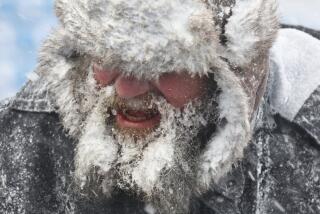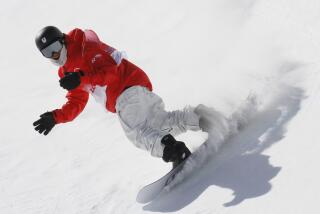U.S. Deployment Bogs Down in Bosnia’s Fog
- Share via
TUZLA, Bosnia-Herzegovina — The fog and snow typical of a Balkan winter are testing the mettle of the American military, forcing the delay Friday of numerous U.S. military flights and slowing the deployment of the Bosnia peacekeeping force.
More than two dozen flights carrying U.S. troops and supplies were canceled or delayed by fog Friday, the second consecutive day that weather has played havoc with the NATO mission.
The flights were scheduled to land at Tuzla air base, site of the future headquarters of 20,000 U.S. troops assigned to enforce a peace agreement for Bosnia-Herzegovina that was signed by the presidents of Bosnia, Croatia and Serb-dominated Yugoslavia on Thursday.
Even worse than the scrubbed flights, the skies over northeastern Bosnia have been so overcast that air traffic controllers have been unable to calibrate radar at the Tuzla air base that would enable planes to land in cloudy weather or at night.
“If there is a qualified preacher in the crowd, I could use the help,” U.S. Air Force Col. Neal Patton told a throng of reporters gathered outside the base.
So far, about 85 soldiers have arrived in Tuzla--only slightly more than the number of journalists waiting in the snow outside the Tuzla base for morsels of news about the U.S. deployment.
U.S. and North Atlantic Treaty Organization officials attempted to put the best face on the delay, saying that the flights can be made up later.
“The weather poses obstacles, but we are overcoming them,” Maj. Simon Haselock, a British spokesman for NATO’s Implementation Force, or IFOR, said in Sarajevo, the capital of Bosnia.
But U.N. officials, who have dealt with Bosnia’s winter conditions over the last three years, suggested that this week’s fog and snow are just the beginning.
*
The U.S. deployment plan “has been hammered out of shape by the uncooperative weather,” one U.N. spokesman said. “It’s enemy weather.”
Among the casualties, according to a senior U.N. source, was the deputy divisional commander of IFOR, U.S. Army Gen. Stan Cherrie, who circled Tuzla air base for hours, unable to land, until almost running out of gas.
He returned to his base in Germany and, in a new aircraft, returned to Tuzla, circling again for several hours before giving up.
For now, the U.S. soldiers who have arrived are keeping a very low profile. They are confined to the Tuzla base and are not allowed to mingle with the local population unless they are involved in specific reconnaissance missions.
U.S. Maj. Gen. William N. Farmen, who directs logistics for the NATO-led deployment, said the weather has had a definite impact on the initial deployment.
“It has slowed [the deployment] down and will continue to slow it down if it keeps up,” Farmen told reporters in Zagreb. “It will have a multiple effect as we get into the [deployment of] larger forces because the backup will get greater and greater over time.”
Despite the severity of the weather, however, Farmen indicated that enough slack was built into the deployment so that--at least so far--the delays have not presented major problems.
Paddock reported from Tuzla and Wilkinson from Sarajevo. Times staff writer Tyler Marshall in Zagreb, Croatia, contributed to this report.
(BEGIN TEXT OF INFOBOX / INFOGRAPHIC)
FACT SHEET
Outfitting the Bosnia Force
Each soldier deployed to Bosnia in the NATO Implementation Force will be issued the following items for cold-weather operations.
M-40 protective mask: 1 each
Duffel bag or kit bag: 2 each
Barracks bag: 1 each
Waterproof bag: 2 each
Intrenching tool: 1 each
Intrenching tool carrier: 1 each
Shelter: 1 each
Helmet, personal armor: 1 each
Cover, helmet camouflage: 1 each
Parka, cold weather, camo.: 1 each
Liner, cold weather: 1 each
Trousers, wet weather: 1 pair
Trousers, extreme cold weather: 1 pair
Poncho, wet weather: 1 each
Suspenders, trousers: 1 set
Suspenders: 1 each
Sleeping bag, extreme cold weather: 1 each
Body armor, protective vest: 1 each
Boots, intermediate cold/wet: 2 pairs
Boots, cold weather: 1 pair
Shirt, cold weather, poly knit: 2 each
Undershirt, cold weather: 3 each
Drawers, extreme cold weather: 3 each
Sweater, wool: 2 each
Canteen, plastic: 2 each
Canteen cover: 2 each
Cup: 2 each
Overshoes, vinyl: 1 pair
Gloves, shell, cold weather: 1 pair
Glove inserts, cold weather: 2 pairs
Work gloves, leather: 1 pair
Belt: 1 each
Mitten shell, trigger finger: 1 pair
Mitten insert, trigger finger: 2 pairs
Blanket, wool: 1 each
Pad mattress: 1 each
Frame, field pack: 1 each
Field pack, nylon: 1 each
First aid dressing: 1 case
Ammo pouch: 2 cases
Deploying personnel are advised to bring a 30-day supply of stationery, postage stamps and personal hygiene items. All individuals will also be issued Geneva Convention cards.
Source: Operation Joint Endeavor via the Internet:
https://www.dtic.dla.mil/bosnia/news/fs002b.html
More to Read
Sign up for Essential California
The most important California stories and recommendations in your inbox every morning.
You may occasionally receive promotional content from the Los Angeles Times.











